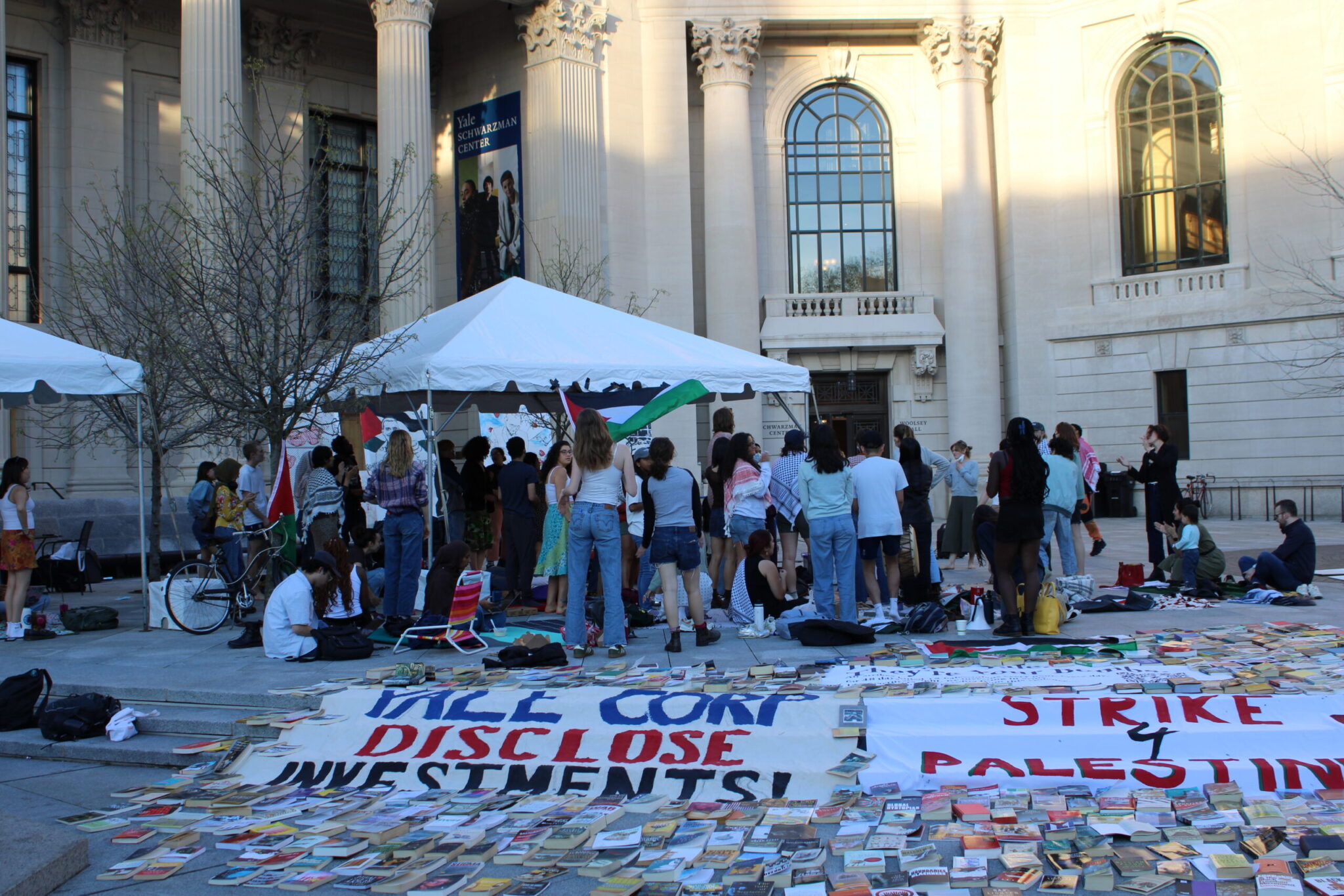Occupy Beinecke holds teach-ins, displays artwork
On the second day of the organizers’ sit-in on Beinecke Plaza, students and faculty members hosted over 12 hours of events to call attention to Israel’s war against Hamas in Gaza.

Samad Hakani, Photography Editor
Pro-Palestine organizers regrouped on Beinecke Plaza on Tuesday morning to continue a weeklong occupation in support of Palestine and calls for the University to divest from military weapons manufacturing.
The protest coincides with Bulldog Days, which began on Monday, and the Yale Corporation’s upcoming meeting in New Haven on Friday and Saturday.
The organizers began arriving just before 8 a.m., alongside pro-Palestine hunger strikers gathered in a tent and an anti-war art installation on Beinecke Plaza. The art installation featured a roughly 10-foot-long model of a fighter jet with messages such as “COMPLACENCY = COMPLICITY” written on its surface.
Throughout the day, the organizers held a series of five teach-ins, vigils and art builds calling on Yale to divest from weapons manufacturing, which they alleged is complicit in Israel’s current war in Palestine.
“This informal coalition that we’ve had,” said Craig Birckhead-Morton ’24. “I think it’s quite historic, I think it’s certainly the most significant action I’ve been involved in here, and I’ve been involved in quite a bit at Yale.”
Pro-Palestinian protesters have been staging demonstrations at Yale since the fall. On Oct. 7, Hamas launched attacks on Israel, killing 1,200 people and taking more than 250 people as hostages. In response, Israel declared war on Hamas and launched a military offensive in Gaza. Israel’s bombardments and ground offensives have killed more than 33,700 Palestinians in Gaza, the Associated Press reported on April 15 based on estimates from the Gaza Health Ministry. According to Israel, Hamas currently holds 133 hostages, 36 of whom are confirmed dead.
According to Yale’s SEC filings, the University holds over 6,400 shares — worth $680,207 — of iShares Core S&P Total U.S. Stock Market ETF, a Blackrock-managed exchange-traded fund. The ETF invests in several weapons manufacturers that sell weapons to Israel, including 0.27 percent of holdings in Raytheon, 0.20 percent in Boeing and 0.19 percent in Lockheed Martin — just under $4,000 across the three companies. Yale, however, publicly discloses just 1 percent of its endowment investments, so it remains unclear exactly to what extent the University invests in weapons manufacturers.
The protesters on the plaza, which Birckhead-Morton referred to as an “informal coalition,” raised awareness for the demonstration through an Instagram account called Occupy Beinecke.
Birckhead-Morton clarified that the coalition of protesters was not organized by any single student organization. Instead, the coalition includes organizers who also plan actions from Yalies4Palestine, Yale Graduate Students for Palestine, the Yale Endowment Justice Coalition and Jewish Voice for Peace New Haven.
Rasheed Tazudeen and Juno Richards, two faculty members in the English department, led the first teach-in, which occurred at 11 a.m. Tazudeen and Richards guided a group of approximately 30 people in a discussion of two poems: “Fuck Your Lecture on Craft, My People Are Dying” by Noor Hindi and “Earth is Narrowing Around Us” by Mahmoud Darwish.
Tazudeen, who teaches a section of ENGL 114 titled “Black and Indigenous Ecologies,” told the News that he hoped the two poems would introduce how nature and poetry can inspire relationality and connection.
“I am invested in how thinking about nature opens new ways to think about our relations, not only to the people around us but to different communities: how do we think about ourselves in relation to Palestine right now?” Tazudeen said to the News. “And I think poetry gives us a way to think about those relations as they are and to imagine new futures and new possibilities that might come out of those relations.”
Tazudeen told the News that he and Richards decided to participate in the event because they felt that “teaching and discussing poetry, ecology, and politics in Palestine and globally would be a good way to be engaged with the broader movement for justice in Palestine.”
The next teach-in, which began at 1 p.m., focused on health and human rights in relation to the war with around 80 students attending.
Immediately after the second teach-in, students began putting up wooden panels painted with portraits of Walid Daqqa and Refaat Alareer, as well as other miscellaneous illustrations.
Daqqa, who passed away from bone marrow cancer while in Israeli custody last week, was convicted and has been imprisoned since 1984 for commanding an Arab Israeli militant group that kidnapped and murdered an Israeli soldier. Alareer was a Palestinian poet and writer who was killed in December by an Israeli airstrike.
The subsequent three teach-ins focused on divestment, militarization and polarization and dance and politics.
Organizers told the News that they planned to replicate the schedule of their evening programming from Monday night.
“As a Muslim student, I’m providing the information that we will be out here every day of the week, praying Maghrib — a sunset prayer — along with vigils organized or led by Jews for Ceasefire,” Birckhead-Morton said. “In addition to that, we’re gonna continue our night and then continue past sunset by staying out here by maintaining our presence and by building on the momentum that we started with Monday.”
Beinecke Plaza, formally known as Hewitt Quadrangle, was constructed in 1901.
Karla Cortes contributed reporting







